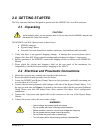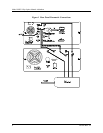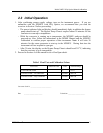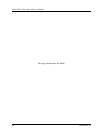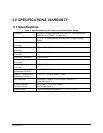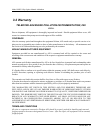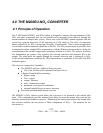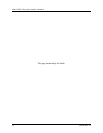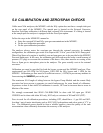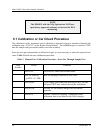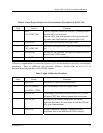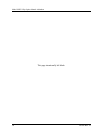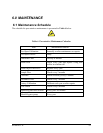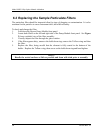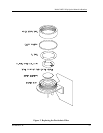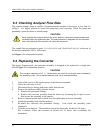
05386 Rev. D 15
5.0 CALIBRATION AND ZERO/SPAN CHECKS
Unlike most NOx analyzers, the M200EU with the NOy option does not have a sample inlet port
on the rear panel of the M200EU. The sample port is located on the External Converter;
therefore Zero/Span calibration is different than a normal NOx instrument. If a fitting is located
at the sample port the analyzer is equipped with the Zero/Span option.
Follow the steps in the M200E/EU manual to:
a. Enter the expected NO and NOy span gas concentrations in the M200EU.
b. Do the zero calibration procedure
c. Do the span calibration procedure
The analyzer always routes the zero/span gas through the external converter. In standard
configuration, the calibration gas needs to be input at the “Cal in” port of the M501 Pump pack.
When Zero/Span valve option is installed, zero and span gases are to be provided at the M200EU
Zero and Span ports. In all cases, the calibration gas delivered must be under a small amount of
pressure (2-5 psig) to overcome the resistance of the hoses. Also, there must be no venting of the
Zero or Span gas to atmosphere prior to the analyzer. The gases actually vent at the external
converter.
Calibration gas must be provided for both the bypass system and the M200EU analyzer. Flow
requirements are 0.80 LPM for NO bypass, 0.80 LPM for NOy bypass and 1 LPM for the
M200EU. Calibration gas flow must be in sufficient excess (~4 LPM) to prevent any ambient air
from entering the SAMPLE port on the pole.
The maximum 50 ft length of tubing between the bypass Pump Module and the remote Moly
converter has been proven to generate too much backpressure for some brands of calibrators.
Experience to date is that while NO calibration is correct, GPT can be incorrect due to errors in
dilution of the ozone.
We strongly recommend that SPAN CALIBRATION be done with NO span gas. SPAN
CHECKS can be done with either NO only, NO2 only or a mixture of NO and NO2 (GPT).
Zero air used for all calibration procedures, including GPT, should have <1 ppt NO and NO2,
less than 1 ppt of major interferents such as SO2, NH3, hydrocarbons and a dew point of -5
o
C or
less. The calibration gasses should be from a reliable supplier, since the quality of the tank
concentration values ultimately determines the accuracy of the analyzer.



